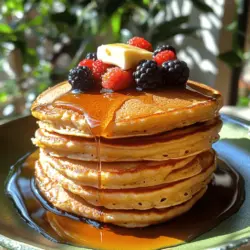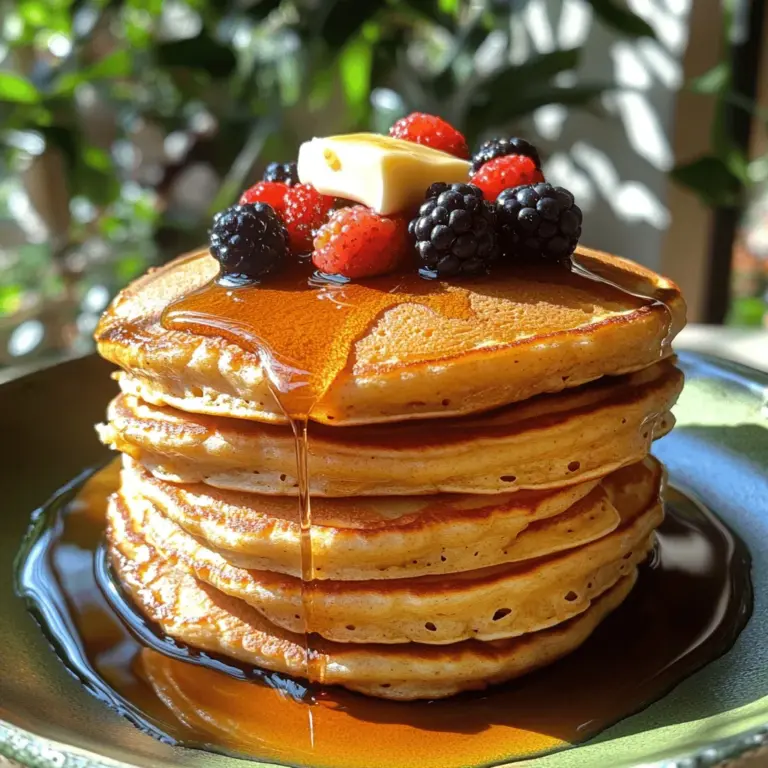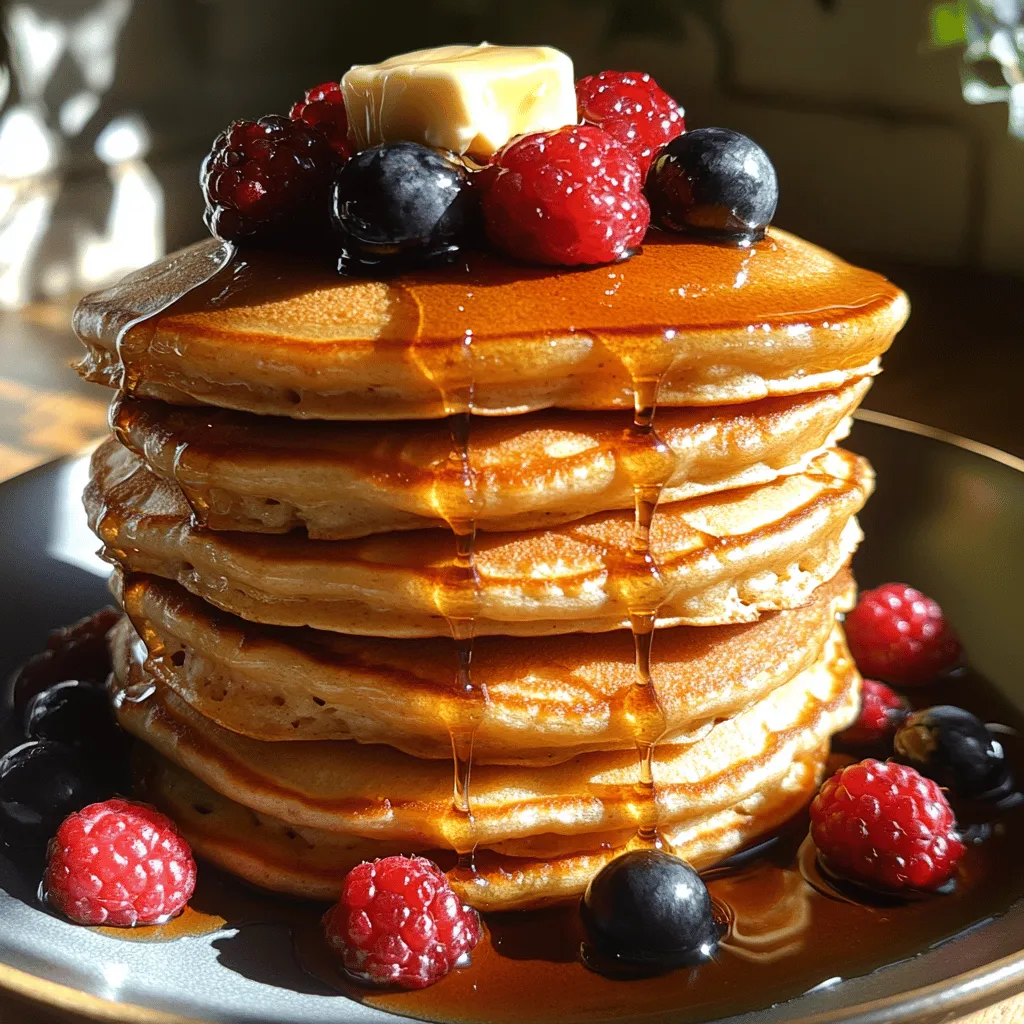Introduction
Begin your morning on a delightful note with our Heavenly Fluffy Buttermilk Pancakes. These pancakes are not just a breakfast staple; they are a heavenly indulgence that can turn an ordinary day into a special occasion. Known for their light and airy texture, these pancakes serve as a perfect canvas for a variety of toppings, making them a versatile choice for any meal of the day. Whether you’re preparing a cozy breakfast for your family or hosting a brunch gathering, these pancakes will impress everyone at the table.
The secret to achieving the fluffiest buttermilk pancakes lies in the balance of ingredients and the technique used in their preparation. In this article, we’ll delve into the essential components that contribute to their deliciousness, explore the science behind pancake texture, and provide a detailed step-by-step guide to making these breakfast delights. By the end, you’ll be equipped to whip up a stack of pancakes that will leave everyone asking for seconds.
Understanding the Key Ingredients
To create the perfect buttermilk pancake, it’s crucial to understand the role of each ingredient. Each component contributes to the overall flavor, texture, and appearance of the pancakes, so let’s take a closer look at these essential ingredients.
All-Purpose Flour
All-purpose flour is the backbone of any pancake recipe. It plays a significant role in determining the texture of the pancakes. The protein content in flour affects how the pancakes rise and hold their shape. While all-purpose flour is the go-to choice for most pancake recipes, using cake flour can yield even lighter pancakes due to its lower protein content. Conversely, using bread flour, which has a higher protein content, might result in denser pancakes.
When measuring flour, it’s important to spoon it into the measuring cup and level it off with a knife to avoid packing it down, which can lead to dense pancakes. Sifting the flour before mixing it with other dry ingredients can also enhance the fluffiness by incorporating air into the mixture.
Granulated Sugar
Granulated sugar does more than just sweeten your pancakes; it plays a crucial role in the browning process when the pancakes hit the hot griddle. This caramelization contributes to the pleasing golden-brown color and adds a subtle depth of flavor. The amount of sugar can be adjusted according to personal preference. If you prefer your pancakes less sweet or plan to top them with syrup or fruit, you might want to reduce the sugar slightly.
Baking Powder and Baking Soda
The leavening agents baking powder and baking soda are key to achieving that desired fluffiness. Baking powder is a complete leavening agent that contains both an acid and a base, while baking soda needs an acidic ingredient to activate it. In this recipe, buttermilk provides the necessary acidity to activate the baking soda, creating carbon dioxide bubbles that help the pancakes rise.
For optimal results, it’s essential to balance these two leavening agents. Too much baking powder can lead to a metallic taste, while too little will result in flat pancakes. A well-measured combination of both will ensure your pancakes are perfectly fluffy.
Buttermilk
Buttermilk is a crucial ingredient that elevates the flavor and texture of pancakes. Its acidity reacts with the baking soda, producing bubbles that create a light and airy pancake. Additionally, buttermilk adds a subtle tanginess that complements the sweetness of the pancakes beautifully.
If you don’t have buttermilk on hand, you can easily make a substitute by mixing regular milk with a tablespoon of vinegar or lemon juice and letting it sit for about five minutes. This will mimic the acidity of buttermilk, helping your pancakes rise effectively.
Eggs and Butter
Eggs play a significant role in pancake recipes, contributing to their structure and richness. They help bind the ingredients together, resulting in a cohesive batter. The protein in eggs also adds to the structure, ensuring that the pancakes hold their shape once cooked.
Melted butter is another key ingredient that adds moisture and flavor to the pancakes. It creates a tender crumb and enhances the overall taste. Be sure to let the melted butter cool slightly before adding it to the batter to avoid scrambling the eggs.
Vanilla Extract
Never underestimate the importance of vanilla extract in your pancake batter. A splash of pure vanilla extract enhances the flavor profile, adding warmth and depth to the pancakes. It’s an easy addition that can make a significant difference in taste.
Optional Toppings
While our Heavenly Fluffy Buttermilk Pancakes are delicious on their own, the possibilities for toppings are endless. Fresh berries, such as blueberries, strawberries, or raspberries, add a burst of color and flavor. Chocolate chips can satisfy sweet cravings, while nuts can provide a satisfying crunch. For a seasonal touch, consider adding pumpkin puree in the fall or citrus zest in the spring. The versatility of these pancakes allows you to get creative and personalize them according to your preferences.
Preparation Steps for Fluffy Buttermilk Pancakes
Now that we’ve covered the essential ingredients, let’s move on to the preparation steps for making the fluffiest buttermilk pancakes. Follow these guidelines closely for a perfect pancake experience.
Preparing the Dry Ingredients
1. Sift the Flour: Sifting the all-purpose flour along with the baking powder, baking soda, and granulated sugar into a large mixing bowl is an important first step. This not only helps to aerate the flour but also ensures that the dry ingredients are evenly combined.
2. Measure Carefully: Use the spoon-and-level method to measure your flour. Avoid scooping directly from the bag, as this can compact the flour and lead to denser pancakes.
3. Mix Dry Ingredients: After sifting, gently whisk the dry ingredients together to combine them evenly. This ensures that the leavening agents are well distributed throughout the flour, which is essential for uniform fluffiness.
4. Create a Well: Once the dry ingredients are mixed, create a well in the center of the dry mixture. This will help incorporate the wet ingredients more easily in the next steps.
By carefully preparing the dry ingredients, you set the foundation for light and fluffy buttermilk pancakes. Stay tuned as we continue with the next steps of combining the wet ingredients and cooking the pancakes to perfection.
Tips for Achieving Consistency in Pancake Batter
Creating the perfect pancake batter is crucial to achieving fluffy, delicious pancakes. Here are some essential tips to maintain consistency and ensure your pancakes turn out just right.
Mixing the Wet Ingredients
To create a harmonious blend within your batter, it’s essential to effectively mix the wet ingredients. Start by measuring out your buttermilk and eggs. Allow the eggs to reach room temperature, as this will help them incorporate better into the batter.
1. Achieving the Perfect Blend of Wet Components: Combine the buttermilk, eggs, and melted butter in a medium bowl. Whisk them together until the mixture is smooth and uniformly combined. This step ensures that the richness of the butter and the tanginess of the buttermilk infuse your pancakes with a delightful flavor.
2. Tips for Ensuring Even Distribution of Flavors: To prevent any pockets of flavor, whisk vigorously until no lumps remain. For an extra touch, consider adding a splash of vanilla extract for sweetness and depth. This can elevate the flavor profile of your pancakes significantly.
Combining Wet and Dry Mixtures
Combining the wet and dry ingredients is a critical step in pancake-making, where the goal is to achieve a light and airy batter without overmixing.
1. Gentle Folding Techniques to Avoid Overmixing: Gradually pour the wet ingredients into the bowl of dry ingredients. Using a rubber spatula or wooden spoon, gently fold the mixture together. The key here is to mix just until the dry ingredients are moistened. This may mean leaving some small lumps in the batter, which is perfectly acceptable.
2. Understanding the Significance of a Lumpy Batter: A lumpy batter is a sign that you haven’t overworked the mixture. Overmixing can lead to gluten development, which results in dense and chewy pancakes instead of the light and fluffy texture we desire. Aim for a batter that is slightly thick yet pourable.
Preheating the Pan
The cooking temperature of your skillet plays a significant role in the texture of your pancakes.
1. Best Practices for Achieving the Right Cooking Temperature: Preheat your skillet or griddle over medium heat for about 5 minutes before pouring in the batter. If you’re using a non-stick skillet, be sure to grease it lightly with butter or oil.
2. How to Test the Skillet for Readiness: To determine if the skillet is hot enough, drop a small amount of batter onto the surface. If it sizzles and bubbles form, the pan is ready. If not, give it another minute before testing again.
Cooking the Pancakes
Cooking pancakes may seem straightforward, but there are techniques to ensure they cook evenly and maintain their fluffiness.
1. Tips for Pouring and Shaping Pancakes on the Skillet: Use a ladle or measuring cup to pour about 1/4 cup of batter onto the skillet for each pancake. For a perfectly round shape, pour the batter in the center and let it spread naturally.
2. Indicators for Flipping Pancakes Without Losing Fluffiness: Watch for bubbles to form on the surface of the pancakes, which is a sign that they are ready to flip. Once the edges look set and the bubbles have popped, use a spatula to gently flip the pancake. Cook for an additional minute on the other side until golden brown.
Keeping Pancakes Warm
To enjoy your pancakes at their best, it’s essential to keep them warm while you finish cooking the batch.
1. Methods for Keeping Pancakes Warm Without Sacrificing Texture: Preheat your oven to 200°F (93°C) and place a baking sheet inside. As each pancake finishes cooking, transfer it to the baking sheet in the oven. This will keep them warm and fluffy without drying them out.
2. Importance of Serving Pancakes Fresh and Hot: Pancakes are best served immediately after cooking. The longer they sit, the more they lose their light, airy texture. Aim to serve them as soon as they come off the skillet for the best experience.
Serving Suggestions
Once your Heavenly Fluffy Buttermilk Pancakes are ready, it’s time to think about presentation and toppings.
1. Creative Ways to Stack and Present Pancakes: Consider stacking your pancakes in groups of three or four, and use a light dusting of powdered sugar on top for an elegant touch. You can also add a dollop of whipped cream for a decadent finish.
2. Exploring Various Topping Combinations for Enhanced Flavors: The possibilities for toppings are endless. Classic options include maple syrup, fresh berries, and sliced bananas. For a gourmet twist, try adding a drizzle of chocolate sauce, a sprinkle of nuts, or a scoop of yogurt for added creaminess.
Nutritional Insights
Understanding the nutritional aspects of buttermilk pancakes can help you make informed choices for your breakfast.
1. Caloric Content: On average, a serving of two buttermilk pancakes contains approximately 350-400 calories, depending on the specific ingredients used. When compared to other breakfast options, pancakes are often more caloric than oatmeal or smoothies, but they provide a satisfying and indulgent treat.
2. Comparison with Alternative Breakfast Options: While pancakes are a delicious choice, balancing them with healthier options like fruit or yogurt can enhance your meal’s overall nutritional profile.
Healthier Modifications
If you’re looking to make your pancakes a bit healthier without sacrificing flavor, consider the following modifications:
1. Suggestions for Making Pancakes Healthier: Swap out regular all-purpose flour for whole wheat or oat flour to increase fiber content. You can also incorporate ground flaxseed or chia seeds for added nutritional benefits.
2. Tips for Reducing Sugar and Fat Content While Maintaining Flavor: Reduce the sugar in the batter slightly and consider using unsweetened applesauce or mashed bananas as a substitute for some of the butter. These alternatives will keep your pancakes moist while lowering the calorie count.
Conclusion
Heavenly Fluffy Buttermilk Pancakes are more than just a breakfast dish; they are a delightful experience that brings comfort and satisfaction. With the right ingredients and techniques, anyone can master this classic recipe. Whether enjoyed on a lazy Sunday morning or served to guests for a special occasion, these pancakes are sure to impress. Embrace the joy of cooking and make your next breakfast unforgettable with these fluffy delights. Remember to play around with flavors and toppings to customize your pancakes to your liking. Happy cooking!


